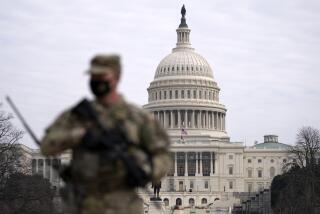Senators Aim to Alter War Powers Act
- Share via
WASHINGTON — Dismissing the 1973 War Powers Resolution as unworkable, a bipartisan group of senators today unveiled new legislation they say would finally give Congress the larger role it wants in decisions on the deployment of U.S. forces during international conflicts.
“Our goal is to make the statute more workable,” said Senate Majority Leader Robert C. Byrd (D-W.Va.), a sponsor of the reform measure.
Commenting about the existing act, Byrd said: “Frankly, if I were President, I would thumb my nose at this legislation. The War Powers Act has never really worked.”
The law was enacted in 1973, over the veto of President Richard M. Nixon, who argued that it was an unconstitutional restriction on his authority. That is the same position taken by all three subsequent Presidents.
The law requires a report from the President when U.S. military personnel are sent to situations of “imminent hostilities.” Under some circumstances, those troops must be withdrawn after 60 days or 90 days, unless Congress specifically votes to authorize them to remain.
The new proposal would let the troops remain for an unspecified length of time unless Congress votes to remove them. It also would create a group of 18 senior congressional leaders who would regularly meet with the President to discuss national security matters.
‘Not Consulted Adequately’
“Presidents have not consulted adequately with Congress prior to making decisions to involve the nation in a situation where hostilities are certain, imminent or probable,” said Byrd, arguing that the new group would change that.
The congressional leadership group could trigger the war powers law by introducing a resolution to either authorize the troops to remain or to order them withdrawn.
Sen. John W. Warner of Virginia, ranking Republican on the Armed Services Committee, said he believes the change is a good idea because the current law “has never worked very well.”
Warner said he does not know whether President Reagan will support the change.
Sen. George J. Mitchell (D-Me.) said that “the War Powers Act is a good example of the limited ability of human beings to predict future events.”
“It was written for the Vietnam War,” said Mitchell, and has been difficult to apply to current situation of small, brief military clashes or terrorist situations.
The most recent dispute over the War Powers Act involves Reagan’s Persian Gulf policy of reflagging 11 Kuwaiti-owned tankers and protecting them with Navy warships. Navy vessels have also been authorized to aid neutral merchant vessels which seek help. Reagan has refused to invoke the law, even though there have been four separate clashes between the Navy and Iran.
More to Read
Sign up for Essential California
The most important California stories and recommendations in your inbox every morning.
You may occasionally receive promotional content from the Los Angeles Times.










